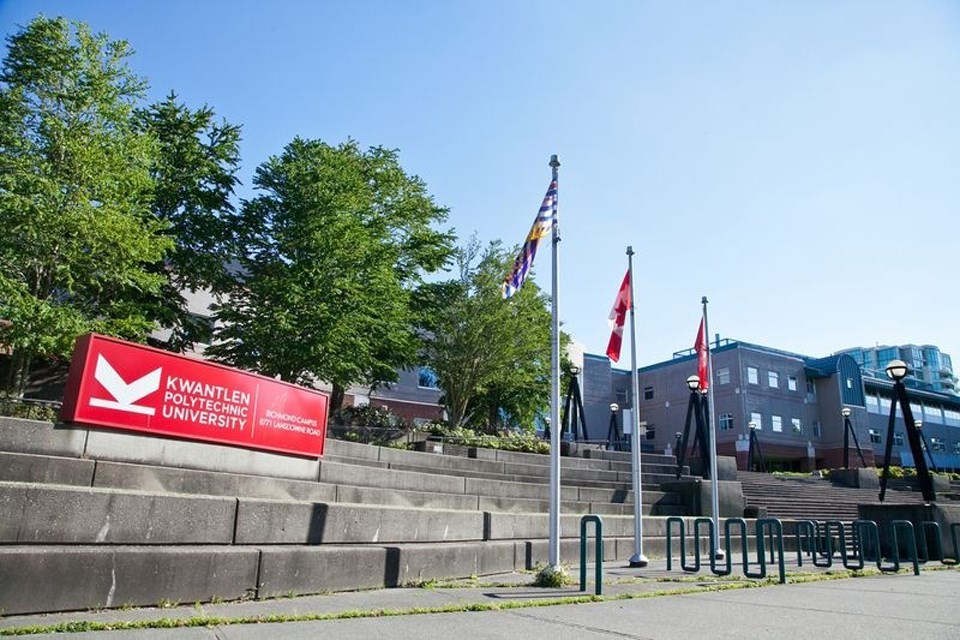Vulnerable students often miss out on going to post-secondary for a variety of reasons including racism or their socio-economic status.
But a course being offered at Kwantlen Polytechnic in Richmond to traditionally marginalized high school students addresses exactly the issues that often keep them from seeking a post-secondary education.
Racism, sexism and poverty are some of the topics addressed in Arts 1100, a course high school students from Richmond School District can take for both secondary and post-secondary credit.
And, thanks to a grant from Scotiabank, marginalized students will be able to take this course for free, offering them a glimpse into the post-secondary experience.
Steve Cardwell, KPU vice-president, said it’s a “sad situation” that Indigenous students or those who are in foster care don’t always see post-secondary as an option.
“Students who are marginalized sometimes don’t know about these programs, they miss out for some reasons or maybe don’t feel like it’s for them,” Cardwell said. “This (course) will be a way to encourage them.”
Three classes of Richmond high school students over the next three years will be able to complete the KPU course. And tuition will be covered for these Richmond classes – and three classes for Surrey students – by a $200,000 grant from Scotiabank.
Richmond School District career education staff told the News they are “excited” at this opportunity for marginalized students.
Not only is it an opportunity to be introduced to post-secondary experience, there will be mentors to help them be successful in the course.
Getting marginalized students into post-secondary fits in with the school district’s goals of inclusion and equity – something the board of education has prioritized in its strategic plan – explained Rav Johal, SD38 director of instruction.
Johal pointed out Richmond has a reputation for being a high-achieving school district, but this shouldn’t allow them to “rest on their laurels.” Rather, the school district has to be “mindful and cognizant” of those students who aren’t achieving success in school, and he said this is why he sees “tremendous potential” in this program.
Marginalized students have many barriers to post-secondary, and many don’t see it as something they can do, explained Johal.
Some of the barriers facing students are mental-health issues, lack of role models and socio-economic issues. And these students might have struggled to attend mainstream schools, Johal explained, adding these barriers are often beyond their control.
“Those barriers may have impacted their thinking around their ability to ever attend post-secondary,” elaborated Terri Lockhart, district coordinator of career programs.
The course has been “designed for success,” she added, even for students who lack self-confidence in a post-secondary environment.
At a recent windup of a similar course in Surrey, Lockhart got goosebumps listening to how the students were transformed by the experience. She said she was also “blown away” by how articulate the students were.
“They found passion and their confidence was oozing,” Lockhart said. “They were inspiring.”
Cardwell said he’s heard “great stories” of students who might not traditionally go to post-secondary find this type of program and go on to excel in their academic studies.
“I think there are stories of students who just needed that extra encouragement and opportunity,” Cardwell said. “This gives it to them.”
Dual-credit programs have been focused in the past on trades programs, but recently have been expanded to academic programs as well, Cardwell added.
The instructor has been carefully chosen because of her empathy for students, and because classes are small, it’s a safe environment for those not used to going to post-secondary, Cardwell explained.
The grant was announced last week, and now Richmond school staff will be reaching out to alternate programs and other groups within the school district to fill the 35 seats for the fall.
Subsequent courses will be offered in the fall of 2023 and 2024.



